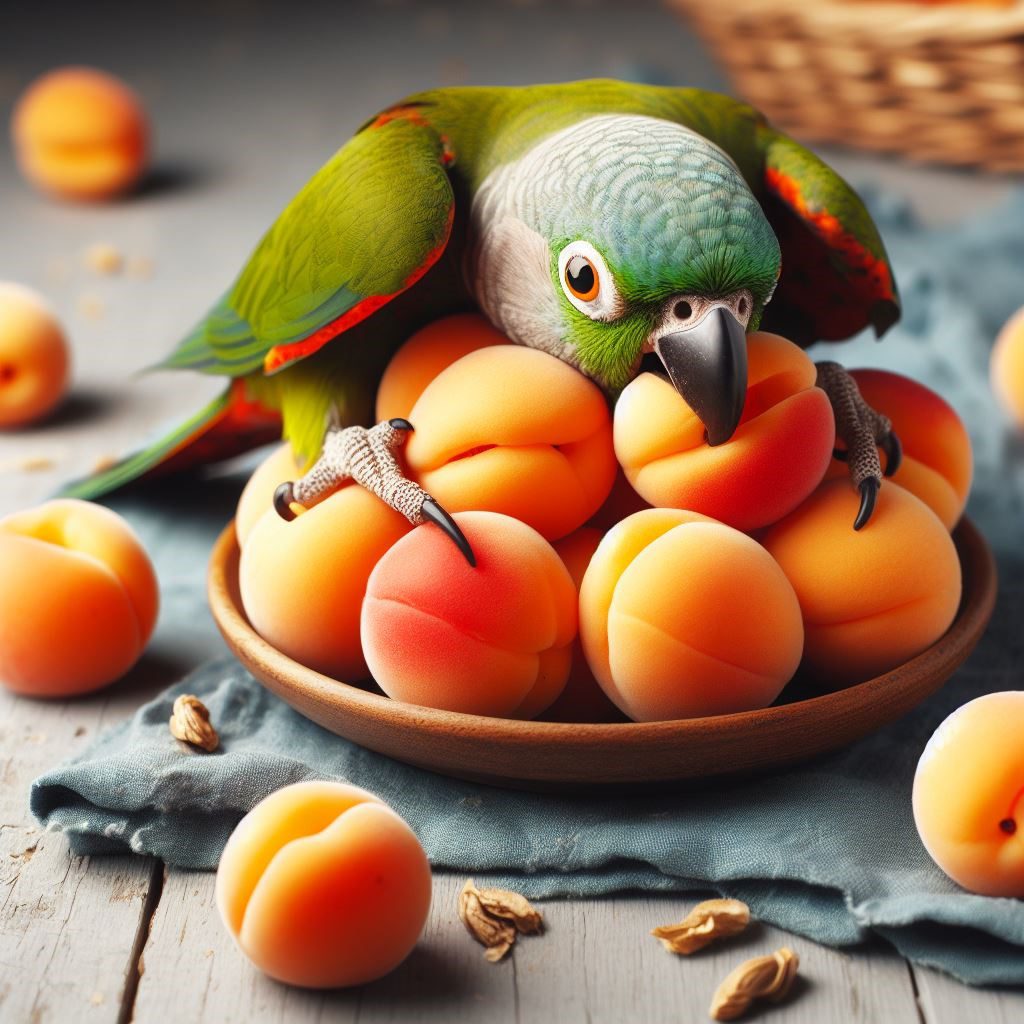Knowing what your parrot can and can’t eat is crucial to being a parrot owner. You wouldn’t feed your child something if you didn’t know the effects it would have on them and parrots are no different, as they rely on us to feed them a well-balanced diet full of nutrients and vitamins to give them the best quality of life possible.
We know parrots love fruits and the majority are good for them and offer plenty of health benefits but this doesn’t mean all fruits are safe for them to eat. What about apricots? Are they safe to feed parrots? Let’s find out.

Can parrots eat apricots? Yes, parrots can eat apricots, similar to plums, mangoes, and peaches apricots contain many vitamins and nutrients that can be beneficial to your bird’s health. However, the pit inside apricots contains cyanide which is poisonous to parrots (and humans) so before serving you need to ensure the pit is removed.
In this article, I’m going to further explain the benefits of apricot, how to remove the pit, and some other things you should know before giving it to your parrot so read on!
Apricot Benefit For Parrots
We know apricot is good for our parrots, but just how good? Let’s take a closer look at the nutritional values.
One whole, fresh apricot contains:
| Calories | 17 |
| Carbs | 4g |
| Protein | <1g |
| Fat | 0g |
| Fiber | 1g |
| Sugar | 3g |
Vitamin A
Apricot contains vitamin A, which is important for keeping your parrot’s skin and eyes healthy. Unfortunately, vitamin A deficiency is quite common in birds, typically in ones who are on an all-seed diet.
If your parrot is deficient in vitamin A they might display signs such as :
- Nasal discharge
- Poor feather quality
- Loss of appetite
- Problems with or around the eyes
- Watery stools
To prevent a vitamin A deficiency feed your parrot foods such as broccoli, spinach, collard greens, carrots, peppers, and cantaloupe.
Vitamin C
Vitamin C is also in apricot, an important antioxidant that protects your parrot’s cells from oxidative stress caused by unstable atoms of free radicals. They work and negatively effect your parrot’s health by causing aging-related illnesses like cancer and heart disease. Antioxidants neutralize these free radicals and fight to protect your parrot.
Vitamin C also has an impressive list of health benefits :
- Lowers blood pressure
- Eye protecting properties
- Anti-inflammatory
- Increased cardiovascular health by removing plaque from blood vessels
- Blood sugar regulator
This is just some of the benefits vitamin C can bring to your parrot. Like many other nutrients vitamin C requires other vitamins and nutrients in order for it to work so it’s important that your bird has a well-balanced diet.
Foods high in vitamin C include: strawberries, broccoli, brussels sprouts, kiwi, cantaloupe and kale are all safe to give to your feathered friends.
Vitamin E
Similar to vitamin C, vitamin E also has some antioxidant properties to reduce oxidative stress.
Vitamin E is also important for healthy skin, blood, and the brain.
Red peppers, pumpkins, almonds, beet greens, and spinach are also full of vitamin E if you need some alternatives to apricot.
Better Digestive Health
Apricot is high in fiber, a carbohydrate that helps massively with your parrot’s digestive system. One way it helps is with improved bowel movements. Fiber works to make stools heavier and softer, this helps to make it easier for your parrot to go to the toilet due to reduced constipation.
Other health benefits of fiber include :
- Weight control
- May help your parrot live longer
- Overall gut health
- Lowers cholesterol
Pears, strawberries, raspberries, carrots, beets, brussels sprouts, and peas all contain fiber to aid with your parrot’s digestive system.
Potassium
Potassium is an important mineral that your parrot needs to function properly. If they don’t get enough potassium in their diet your bird could experience fatigue, irregular heartbeat and muscle problems like spasms or weakness.
Potassium is needed for :
- Controlling blood pressure
- Balanced heart rhythm
- Helps with their muscle control
- To maintain a normal fluid balance
Kiwis, oranges, pineapples, bananas, carrots, and nuts are all safe sources of potassium you can give to your parrot.
How You Should Feed Apricots To Your Parrot
As we covered in the introduction, before you feed apricot to your parrot you need to remove the pit or stone as it’s poisonous to them.
Luckily for your parrots (and you) removing the pit isn’t difficult at all.
- Slice the apricot with a sharp kitchen knife.
- Twist and pull the two halves apart so you have two pieces.
- Pull the stone out of whatever side it’s in, you can use a knife to scoop it out also.
- Discard the pit and don’t leave it lying around for your parrot to eat.
You now have a completely edible apricot your parrot can reap the health benefits. You should slice up the rest of the fruit into little pieces for your parrot to safely consume.
It’s good to do this to prevent any choking hazard and to portion control so your parrot doesn’t overeat.
Are There Any Risks To Feeding Apricot To Your Parrot
The only risk in apricots is the stone as it’s poisonous for your parrot due to it containing amygdalin. This substance is then converted to cyanide once it’s consumed. It’s only harmful when it’s bit into and chewed, for example, if you were to eat an apricot and swallow it whole then you wouldn’t need to worry about cyanide poisoning.
However, this wouldn’t be possible for parrots as they would need to bite into it to make it smaller and eat it.
Symptoms of cyanide poisoning include :
- A drop in blood pressure
- Fever
- Increased thirst
- Lethargy
- Muscle pain
- Insomnia
Apricot isn’t the only food with cyanide in it you should also be cautious with Cherries, plums, peaches, apples, and pears.
What Other Foods Can Your Parrot Eat?
You know apricots are safe for your parrot to eat but if you’re like me then you’re always looking for new foods to improve your parrot’s diet to create some variety and and include vital things that aren’t already in your bird’s diet.
So what other foods can your parrot eat?
- Fruit & Vegetables
Foods like asparagus, broccoli, carrots, peppers, bananas, blueberries, and pineapples are all fine and encouraged for your Parrot to eat.
- Nuts
Things like almonds, Brazil nuts, cashews, hazelnuts, pistachios, and walnuts can be fed to your parrot. Just be wary of the fat content in some of them so they may need to be treated as a snack for your Parrot. We don’t want them getting fat!
Apricot For Parrots – Final Thoughts
Apricot is a safe nutritious fruit your parrot can enjoy in moderation, as it’s a fruit that shouldn’t make up too much of your parrot’s diet. Once the stone of the apricot is removed it’s safe for consumption. Your parrot’s diet should consist of pelleted foods, seed mixes, nuts, fruits, and organic vegetables to give them a healthy happy life.
I hope you have found this article useful and your feathered friends enjoy a yummy new snack.






